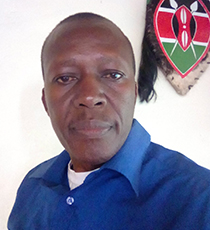
As English Common Law became the predominant justice system in Africa, many tribes gradually abandoned their own means of settling grievances altogether. Unfortunately, an end result was that justice became more and more elusive, especially to those who live on less than a dollar a day.
As a Rotary Peace Fellow sponsored by the Rotary Club of Ashland, Oregon, USA, I was privileged to study peace and conflict resolution for a professional development certificate at the Rotary Peace Center at Chulalongkorn University in Thailand. My time there in 2013 energized me to return to my native Kenya, and dedicate myself to dusting off the old justice systems that existed before English Common Law. I became dedicated to sounding the trumpet to the outside world that there were other systems that could serve as a fountain of justice and provide greater access to the disenfranchised.
After much work, local organizations began to take interest in a system used by the Kuria tribe called Justice Under Tree (as the hearings are conducted under a tree). In December, the Kenyan government sent a task force from the judiciary to study this system. Courts in Kenya will now recognize rulings/judgments rendered by these long forgotten traditional methods as long as they do not contravene the country’s constitution.
There are several gains in the recognition of the Kuria justice system:
- Justice will be accessible at very low cost and affordable to everyone.
- Justice will take less than three weeks (three sittings) to conclude (as compared to 14 years that cases can take in conventional courts).
- The proceedings will be conducted in the language that local folks understand, with no legal jargon and in a friendly atmosphere.
- There will be no legal technicalities which often give an upper hand to violators over their victims.
- Sittings are conducted in the conflict area, where neighbors can be sought to verify the claims of the conflicting parties.
- Tycoons who have been grabbing land from the poor will now have a harder time doing so.
- There is more chance the end results restore relationships and strengthen the fabric of the community
I am grateful for my time at Chulalongkorn, and my Rotary scholarship that allowed me to play a part in making justice more accessible in my native country.
Learn more about Rotary Peace Fellowships
About the author: George Chacha received a Rotary Peace Fellowship to study at Chulalongkorn University in 2013. He is the founder and director of People for Rural Change Trust, a community organization which works on peace and cohesion, among others issues, in the western part of Kenya.



